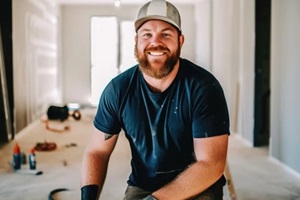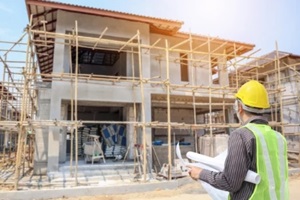 Residential construction in Virginia is surging in popularity; year over year, the state sees an average of 3% more single-family homes springing to life. That’s hundreds of homes each year, and with so much construction going on, contractors must invest in high-quality insurance coverage to protect against the potential for catastrophic damage during a build.
Residential construction in Virginia is surging in popularity; year over year, the state sees an average of 3% more single-family homes springing to life. That’s hundreds of homes each year, and with so much construction going on, contractors must invest in high-quality insurance coverage to protect against the potential for catastrophic damage during a build.
Contractors can find themselves on the hook for significant expenses to repair damage or even restart construction, and homeowners may find themselves inconvenienced by delayed timelines. That’s why it’s essential for home builders to carefully abide by the insurance guidelines outlined in Virginia, from groundbreaking on a work site to turning the key over to the proud new owners.
Here’s an overview of some of the basic underpinnings of Virginia’s insurance scene regarding home builder’s insurance.
What Is Course of Construction Insurance?
Course of construction insurance is more commonly referred to as builders risk insurance. This type of coverage addresses the many risks that homes face while they are in the process of being constructed. Without many safety features installed, residential properties in the early stages can be especially vulnerable to threats like fire or wind damage.
A builder’s risk policy can cover some soft costs related to construction issues. For example, suppose the project is delayed due to a fire that necessitates part or all of the structure to be demolished and rebuilt. In that case, the homeowners may need to find alternate housing arrangements to adapt to the new completion timeline. Builders’ risk insurance can pay for rental costs and other expenses during this time.
The Types of Home Builder’s Risk Insurance
Builders’ risk insurance is unique to each construction company based on factors ranging from the project’s scope to the number of employees. Single contract builders’ risk insurance is typically taken out for a singular project, and a new policy must be acquired at the start of the next project. Conversely, blanket deposit coverage is used for teams that typically complete 25 projects annually.
In alternative circumstances, an insurer may determine the type of policy based on the total estimated value of the construction rather than the number of builds. Be sure to review the details of any policy carefully to ensure it aligns with the project’s goals and the risks unique to your area and build.
Is Home Builder’s Risk Insurance Mandatory in Virginia?
Virginia does not necessarily require builders’ risk insurance for construction teams, though it is unwise to approach a project without it. The law dictates that contractors and subcontractors are not required to demonstrate builders’ risk insurance coverage if they are enrolled in a construction program controlled by the owner and already possess their inherent insurance protections.
Thus, whether builders’ risk insurance is mandatory depends on how the construction team is organized and operated. Regardless of legal mandates, it is always wise to carry builders’ risk insurance to shield your construction team from the financial consequences of unexpected or unpredictable damage on the work site.
What Isn’t Covered Under Home Builder’s Risk Insurance
 Builders’ risk insurance is a valuable asset for any construction team, but it alone does not fully address a crew’s potential risks. The primary area of note is that builders’ risk insurance only addresses damages on the residential work site. If the construction crew causes damage to another individual outside of the team or harms their property, builders’ risk insurance will not cover these damages.
Builders’ risk insurance is a valuable asset for any construction team, but it alone does not fully address a crew’s potential risks. The primary area of note is that builders’ risk insurance only addresses damages on the residential work site. If the construction crew causes damage to another individual outside of the team or harms their property, builders’ risk insurance will not cover these damages.
Instead, this is the role of general liability insurance. Many jurisdictions will not issue permits to construction crews that do not have general liability insurance, so be sure to check the minimum amount of coverage required to obtain the necessary permits for a build. Unlike builder’s risk insurance, general liability coverage safeguards against personal injury or property damage for third parties affected by the construction project.
Get Home Builder’s Insurance from the Industry Professionals at Burton & Company
Whether you are approaching your company’s first residential build or your hundredth, be sure not to neglect comprehensive builders’ risk insurance. The most appropriate time to acquire this coverage is before the project starts to keep the task secure and avoid hassle and unnecessary effort.
The team at Burton & Company can help you explore your options for builders’ risk insurance and understand how it fits in with general liability and other essential protections. Contact Burton & Company to schedule an appointment.

